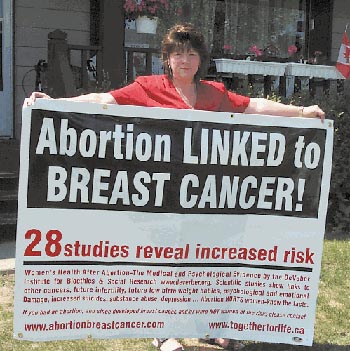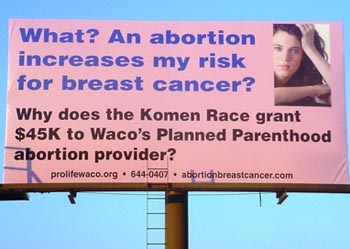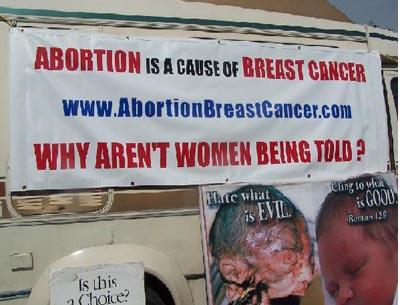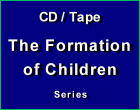Right to Life
 |
 |
 |
 |
 |
 |
 |
Abortion Nearly Triples
Breast Cancer Risk, Study Finds
A study by Dr. Janet Daling, (who by the way, is pro-choice) and her colleagues at Seattle's Fred Hutchinson Cancer Research Center found that abortions increase the risk of breast cancer on an average of 50%. (1)
 But the Daling study contained even more frightening results, largely ignored by the media.
But the Daling study contained even more frightening results, largely ignored by the media.
If a woman had obtained her first abortion after age 30, her risk jumped by 110%. And if she had her first abortion before she turned 18, the likelihood of having breast cancer increased by 150%. Worse yet, if she has a family history (mother, sister, aunt) of breast cancer and had a first abortion after age 30, her risk went up by 270%.
Most ominous of all were the results for women who had an abortion before age 18 and who also had a family history of breast cancer. Twelve women in the Daling study fit that description. Every one of them got breast cancer before age 45. Not 50%, or 75%, but EVERY ONE.
You would think the media would jump all over this, but no, saving lives has to take a back seat to the killing of unborn children.
Significant breast cancer risk from abortion
The following article by Steven Ertelt was published by LifeNews.com on November 28, 2011.
A new study published by scientists who examined diabetes mellitus type 2, reproductive factors, and breast cancer found a statistically significant association showing a 2.86-fold increased breast cancer risk from a single induced abortion.
The study, led by Lilit Khachatryan, included researchers from Johns Hopkins School of Public Health and the University of Pennsylvania. Khachatryan is from the Department of Public Health, American University of Armenia, Yerevan, Armenia; Robert Scharpfb is from the Johns Hopkins School of Public Health and Sarah Kagan is from the School of Nursing at the University of Pennsylvania.
The study, published in Taylor & Francis, also found that delaying a first full-term pregnancy, which is frequently done by women having abortions, also raises the breast cancer risk wheras giving birth resulted in a 64% reduced risk.
 Khachatryan’s team reported a statistically significant 13% increased breast cancer risk for every one year delay of a first full term pregnancy (FFTP), with delayed FFTPs until ages 21-30 or after age 30 resulting in 2.21-fold and 4.95-fold increased risks respectively. On the other hand, women with FFTPs before age 20 did not see a comparable breast cancer risk.
Khachatryan’s team reported a statistically significant 13% increased breast cancer risk for every one year delay of a first full term pregnancy (FFTP), with delayed FFTPs until ages 21-30 or after age 30 resulting in 2.21-fold and 4.95-fold increased risks respectively. On the other hand, women with FFTPs before age 20 did not see a comparable breast cancer risk.
They wrote: “Any birth was protective (adjusted OR = 0.36, 95% CI 0.20–0.66). Each year delay in first pregnancy increased risk (adjusted OR = 1.13, 95% CI 1.01–1.27) as did induced abortions (adjusted OR = 2.86, 95% CI 1.02–8.04).”
Karen Malec of the Coalition on Abortion/Breast Cancer said she is not surprised by the findings because, “Fifty-four of 67 epidemiological studies since 1957 report an abortion-breast cancer link (not counting biological and experimental evidence).”
The study was not without some problems, Malec said, as the authors only once severely criticized the study (Melbye et al. 1997) to make a claim that they did not believe there was enough evidence to prove the abortion-breast cancer link. Although Melbye’s team found no overall increased risk, they reported a statistically significant 89% increased risk for those having abortions after 18 weeks gestation.
Malec also noted another problem: “Khachatryan’s group cited recall bias as a possible limitation of their study, but tellingly provided no citations to support that claim. According to this hypothesis, the only reason that scientists find an ABC link is not because abortion really does raise risk. Rather, more women with breast cancer accurately report their past abortions than do healthy women,” she said.
 “Similarly, authors of the Uzbekistan Health Examination Survey (which received financial and technical assistance through the US AID-funded MEASURE DHS+ program) said induced abortion is not negatively stigmatized in former Soviet States and that the collection of data is, therefore, successful,” she added.
“Similarly, authors of the Uzbekistan Health Examination Survey (which received financial and technical assistance through the US AID-funded MEASURE DHS+ program) said induced abortion is not negatively stigmatized in former Soviet States and that the collection of data is, therefore, successful,” she added.
“National Cancer Institute (NCI) branch chief Dr. Louise Brinton and her colleagues admitted in a 2009 study led by Jessica Dolle that abortion raises risk,” she said. “”They demonstrated that they know recall bias is a red herring used to prop up abortion. After Brinton and the NCI told women during the agency’s 2003 workshop to disregard retrospective studies because they were flawed due to recall bias, Brinton and Jessica Dolle and their colleagues subsequently used supposedly “flawed” data from their group’s 1994 and 1996 studies for their 2009 study.”
She notes that Dr. Joel Brind, one of the world’s foremost researchers on abortion and breast cancer, says, “The recall bias argument has been repeatedly disproved in the literature.”
Brind concluded that Khachatryan’s team “did not - and perhaps were not allowed to - characterize their findings honestly in the politically correct atmosphere of the U.S. and Europe. The good news is that they were able to report their findings in a prominent peer-reviewed journal at all.”

Posted October 4, 2013

The Daling study confirms other reports of the breast cancer-abortion link
If a woman had obtained her first abortion after age 30, her risk jumped by 110%. And if she had her first abortion before she turned 18, the likelihood of having breast cancer increased by 150%. Worse yet, if she has a family history (mother, sister, aunt) of breast cancer and had a first abortion after age 30, her risk went up by 270%.
Most ominous of all were the results for women who had an abortion before age 18 and who also had a family history of breast cancer. Twelve women in the Daling study fit that description. Every one of them got breast cancer before age 45. Not 50%, or 75%, but EVERY ONE.
You would think the media would jump all over this, but no, saving lives has to take a back seat to the killing of unborn children.
Significant breast cancer risk from abortion
The following article by Steven Ertelt was published by LifeNews.com on November 28, 2011.
A new study published by scientists who examined diabetes mellitus type 2, reproductive factors, and breast cancer found a statistically significant association showing a 2.86-fold increased breast cancer risk from a single induced abortion.
The study, led by Lilit Khachatryan, included researchers from Johns Hopkins School of Public Health and the University of Pennsylvania. Khachatryan is from the Department of Public Health, American University of Armenia, Yerevan, Armenia; Robert Scharpfb is from the Johns Hopkins School of Public Health and Sarah Kagan is from the School of Nursing at the University of Pennsylvania.
The study, published in Taylor & Francis, also found that delaying a first full-term pregnancy, which is frequently done by women having abortions, also raises the breast cancer risk wheras giving birth resulted in a 64% reduced risk.

A billboard in Waco, TX, informs women of the high health risk involved with abortion
They wrote: “Any birth was protective (adjusted OR = 0.36, 95% CI 0.20–0.66). Each year delay in first pregnancy increased risk (adjusted OR = 1.13, 95% CI 1.01–1.27) as did induced abortions (adjusted OR = 2.86, 95% CI 1.02–8.04).”
Karen Malec of the Coalition on Abortion/Breast Cancer said she is not surprised by the findings because, “Fifty-four of 67 epidemiological studies since 1957 report an abortion-breast cancer link (not counting biological and experimental evidence).”
The study was not without some problems, Malec said, as the authors only once severely criticized the study (Melbye et al. 1997) to make a claim that they did not believe there was enough evidence to prove the abortion-breast cancer link. Although Melbye’s team found no overall increased risk, they reported a statistically significant 89% increased risk for those having abortions after 18 weeks gestation.
Malec also noted another problem: “Khachatryan’s group cited recall bias as a possible limitation of their study, but tellingly provided no citations to support that claim. According to this hypothesis, the only reason that scientists find an ABC link is not because abortion really does raise risk. Rather, more women with breast cancer accurately report their past abortions than do healthy women,” she said.
A banner at a Avon Walk for Breast Cancer on the abortion danger, never mentioned by the sponsor
“National Cancer Institute (NCI) branch chief Dr. Louise Brinton and her colleagues admitted in a 2009 study led by Jessica Dolle that abortion raises risk,” she said. “”They demonstrated that they know recall bias is a red herring used to prop up abortion. After Brinton and the NCI told women during the agency’s 2003 workshop to disregard retrospective studies because they were flawed due to recall bias, Brinton and Jessica Dolle and their colleagues subsequently used supposedly “flawed” data from their group’s 1994 and 1996 studies for their 2009 study.”
She notes that Dr. Joel Brind, one of the world’s foremost researchers on abortion and breast cancer, says, “The recall bias argument has been repeatedly disproved in the literature.”
Brind concluded that Khachatryan’s team “did not - and perhaps were not allowed to - characterize their findings honestly in the politically correct atmosphere of the U.S. and Europe. The good news is that they were able to report their findings in a prominent peer-reviewed journal at all.”

Posted October 4, 2013
______________________
______________________











